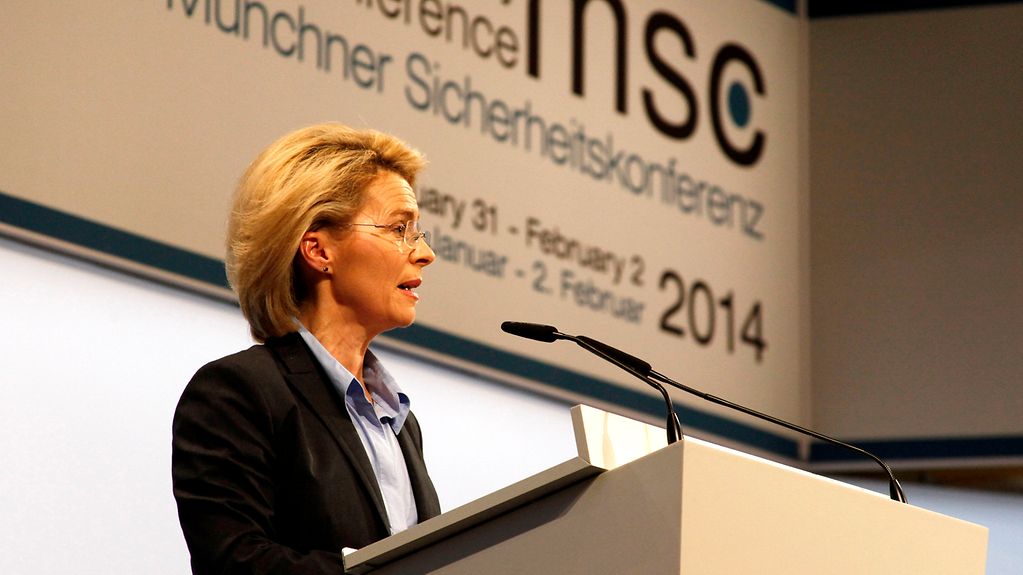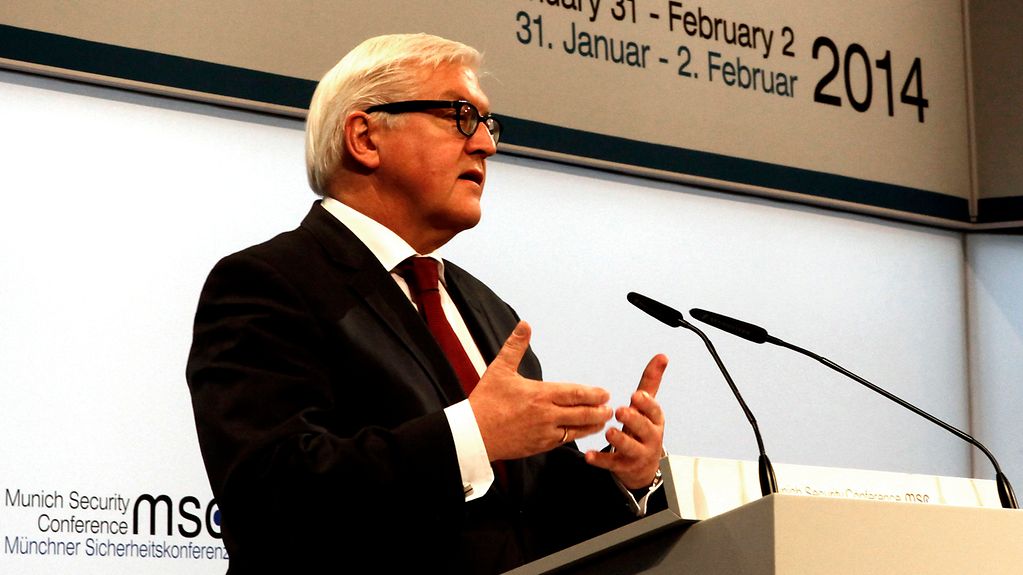Munich Security Conference
Peace, liberty and security cannot be taken for granted, declared Federal Foreign Minister Ursula von der Leyen at the Munich Security Conference. "We remain strongly committed to the United Nations, our transatlantic bond and the European Union."
5 min reading time

Multinational cooperation should not be limited to Afghanistan
Photo: Zwez/MSC
Crises and conflicts can be found all over the world, and they affect us in a very direct manner, explained Ursula von der Leyen on Friday. In future, Europeans will have to plan and act together.
This year’s Munich Security Conference is taking place from 31 January to 2 February. Alongside the Federal Defence Minister, Federal Foreign Minister Frank-Walter Steinmeier, Federal Interior Minister Thomas de Maizière, Federal Economics Minister Sigmar Gabriel and Federal Transport Minister Alexander Dobrindt are attending.
Support for Afghanistan even after 2014
The Federal Defence Minister re-affirmed the willingness of the German government to support Afghanistan even after the withdrawal of combat troops. During her recent visit she saw how well cooperation works among the 16 different states involved in the International Security Assistance Force (ISAF) in northern Afghanistan, she reported. This cooperation ought to be continued. Germany is ready to remain engaged in the north of the country as lead nation, said Ursula von der Leyen.
But multinational cooperation in its best form should not be confined to Afghanistan, continued the Federal Defence Minister. European nations ought to be prepared to take over a fair share of the transatlantic burden – in a combined, consensual and efficient manner.
Crises and conflicts affect those who feel any responsibility for international stability. And these crises and conflicts appeal to our humanitarian conscience not to abandon those who are suffering most. Indifference is not an option for a country like Germany, declared Ursula von der Leyen.
Finding a sustainable solution to crises
To find sustainable solutions to crises, like those in Africa, it is crucial to enable reliable partners in the country to take charge of their own security. These partners could be regional organisations or individual states, and training, advisory services, assistance, and supplies of equipment if necessary can enable them to accept and perform this role.
Frank-Walter Steinmeier on Germany’s role in the world
Federal Foreign Minister Frank-Walter Steinmeier opened the second day of the conference in Munich. In his speech on Saturday he noted that violent conflicts have moved closer to Europe.

We must engage earlier, more decisively and more substantially
Photo: Zwez/MSC
In matters of foreign policy Germany should engage earlier, more decisively and more substantially, he said. Assistance must be concrete, for instance the destruction of Syria’s chemical weapons. "Germany aims to bring impetus to European security policy," said Frank-Walter Steinmeier, "and that is just what we will do".
Military intervention can only ever be the last resort. In relations with Russia, ways must be found of making the relationship more constructive, said the Federal Foreign Minister. Europe and the United States have cooperated extremely closely over the past decades. Transatlantic relations remain substantial for Germany. This partnership will have to be renewed in the wake of the loss of trust it has sustained.
Cyber security
During a panel discussion on Friday, Federal Interior Minister Thomas de Maizière underscored the importance of internet security. It is not enough in this context simply to focus on the NSA, he said. He listed three points essential for internet security: above all legislation and policies, agreements and international relations must ensure security. To these must be added the security that technology can provide, and the security that every user can achieve through circumspection.
On the issue of the NSA the Federal Interior Minister said that Germany needs the closest of cooperation with America and with intelligence agencies. The information we are given about the activities of the NSA is insufficient and the political fall-out has been damaging.
Federal President opens anniversary conference
On Friday, Federal President Joachim Gauck opened the 50th Munich Security Conference. In his speech he stressed that we can no longer imagine a time without the conference. Security remains a question of survival for individuals and nations alike.
In his speech he looked at the role of Germany in the world. Germany today, he said, is a good Germany –"the best we’ve ever known". Today Germany is a reliable partner within Europe and in the world. "Step by step our country has transformed itself from a beneficiary to a guarantor of international security and order." But Germany should make a more substantial contribution, and it should make it earlier and more decisively, said the Federal President. This also includes the deployment of the Federal Armed Forces, the Bundeswehr, where this is necessary and where it is used in conjunction with other measures.
The Federal President closed with an appeal for a broader discussion of security-policy issues in Germany.
Focus on crises
The current crises in the world dominated the agenda of the conference. The future of European defence policy too is a focus. Intelligence services, cyber defence and energy- and climate-policy issues will be discussed.
High-ranking guests
The conference organisers are expecting about 70 government delegations. More than fifteen heads of state and government will come together. Over 60 ministers of foreign affairs and defence ministers are expected, along with five EU commissioners. Also on the guest list are United Nations Secretary-General Ban Ki-moon and US Secretary of State John Kerry.
The Munich Security Conference is seen at international level as one of the world’s most important meetings on foreign and security policy. It provides a forum for heads of state and government, politicians responsible for security, and representatives of armed forces, business and the academic community to discuss topical crises. Free of any diplomatic constraints, participants can speak openly.
This is the fiftieth Munich Security Conference. The German publisher Ewald von Kleist initiated the conference in 1963, when it was known as the "Wehrkunde Conference". Since 2008 it has been chaired by Wolfgang Ischinger, former German Ambassador in London and Washington D.C.